Vitamin E is a fat-soluble antioxidant that protects your cells from damage, strengthens your immunity, and keeps your skin glowing and youthful.
Scientists have long recognized its role in fighting oxidative stress — one of the key drivers of premature aging and chronic disease.
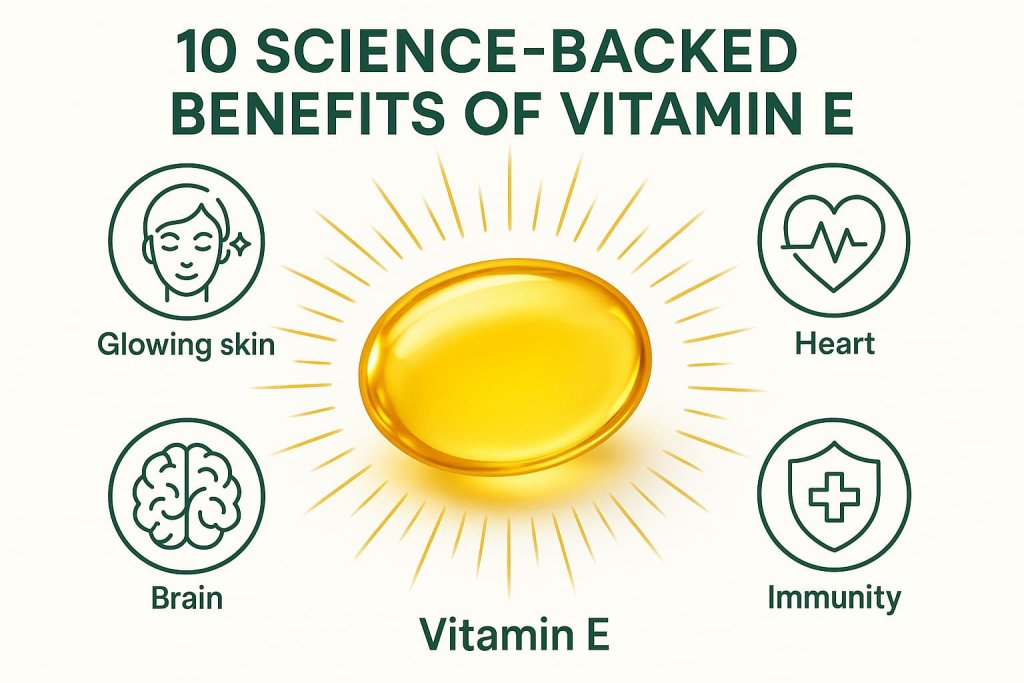
Understanding the benefits of vitamin E is important because it supports multiple systems at once — your skin, heart, brain, eyes, and immune defenses all depend on it. Whether you get it from foods like almonds and spinach or through supplements, vitamin E acts as your body’s natural shield against free radicals.
In this guide, you’ll discover the 10 science-backed benefits of vitamin E, how much you need daily, the best food sources, and key safety tips — all based on data from trusted sources like the NIH, Harvard Health, and the Cleveland Clinic.
Let’s explore why this nutrient deserves a permanent place in your diet.
What Is Vitamin E?
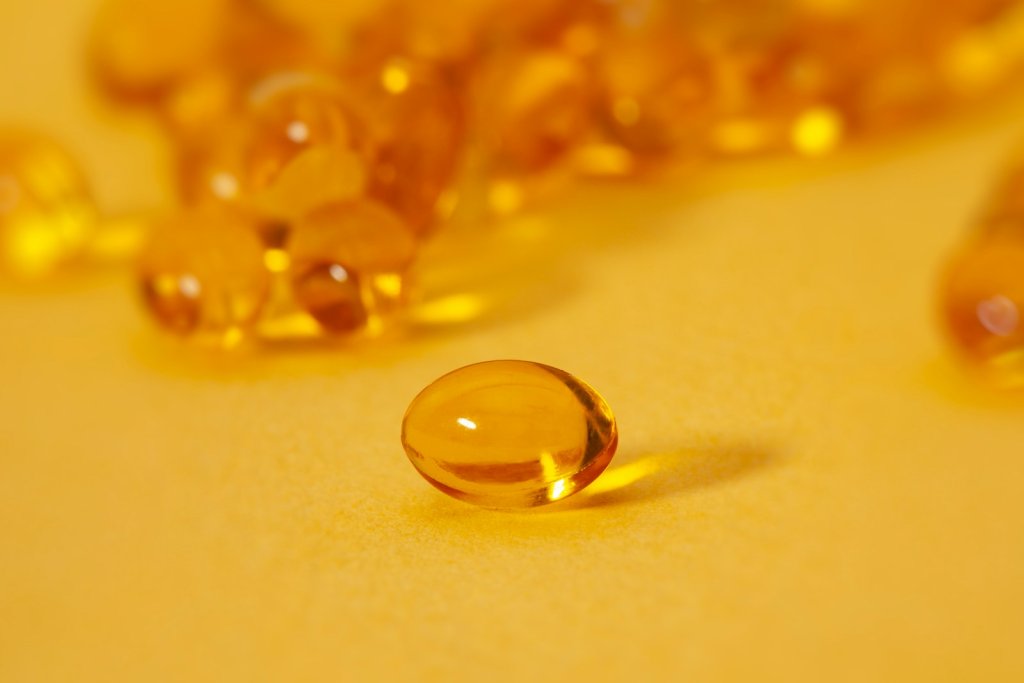
Vitamin E is a group of eight fat-soluble compounds — four tocopherols and four tocotrienols — that function primarily as antioxidants to protect your body’s cells from damage.
Among these, alpha-tocopherol is the most biologically active and the main form found in the human bloodstream.
Vitamin E helps stabilize cell membranes, preventing oxidative stress caused by free radicals — unstable molecules that can damage DNA, fats, and proteins. This protective action slows cellular aging and supports overall tissue health.
Beyond its antioxidant power, vitamin E plays several important physiological roles:
- 🧠 Supports the immune system: Helps T-cells and other white blood cells function effectively.
- ❤️ Promotes heart and vascular health: Maintains blood vessel elasticity and helps prevent LDL oxidation.
- 🌿 Nourishes skin and eyes: Encourages healing, moisture balance, and UV protection.
- ⚖️ Regulates hormonal balance: Supports endocrine and reproductive functions.
Because it’s fat-soluble, vitamin E is absorbed with dietary fats and stored in the liver and adipose tissue for later use. Consuming it with foods rich in healthy fats (like olive oil or avocado) enhances absorption.
👉 According to the Harvard T.H. Chan School of Public Health, vitamin E is essential for protecting cell membranes, boosting immunity, and supporting skin and eye health through its antioxidant properties.
10 Science-Backed Benefits of Vitamin E
1. Acts as a Powerful Antioxidant
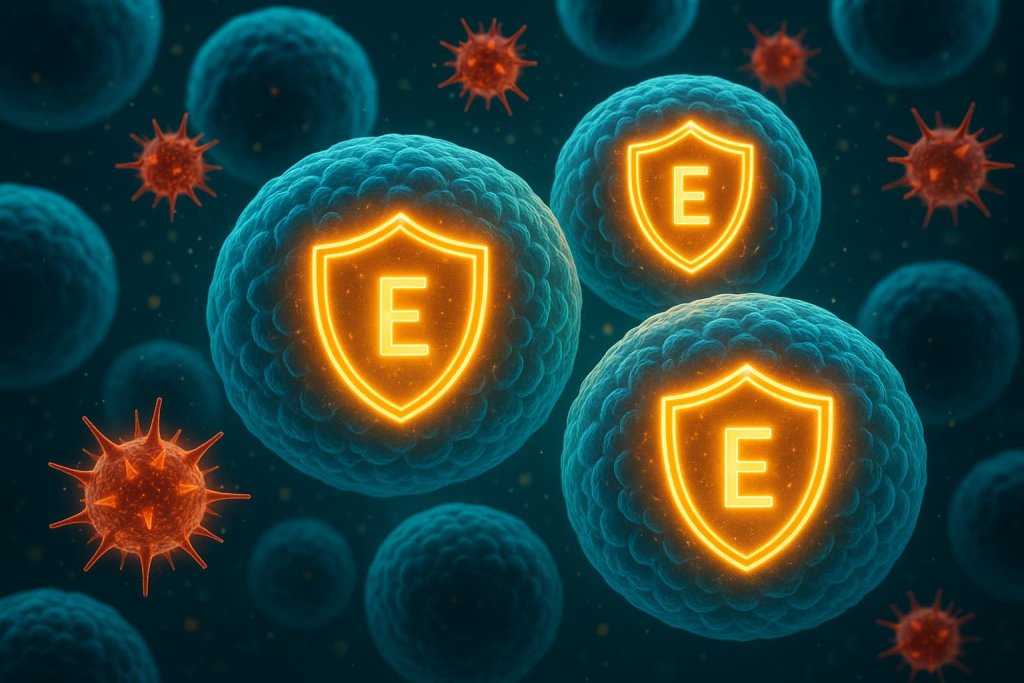
Vitamin E is one of the body’s most effective antioxidants, helping protect every cell from free-radical damage. Free radicals are unstable molecules formed by normal metabolism, pollution, and UV exposure — and they’re linked to premature aging, inflammation, and chronic diseases like heart disease and cancer.
According to a 2022 review in Nutrients, vitamin E neutralizes these unstable molecules by donating electrons, thus stopping oxidative chain reactions that damage DNA, proteins, and cell membranes.
Regular intake of vitamin E-rich foods such as almonds, sunflower seeds, and spinach supports youthful skin, better cell renewal, and long-term health resilience.
In short: Vitamin E works as your body’s internal shield, protecting tissues from oxidative wear and tear.
2. Strengthens the Immune System
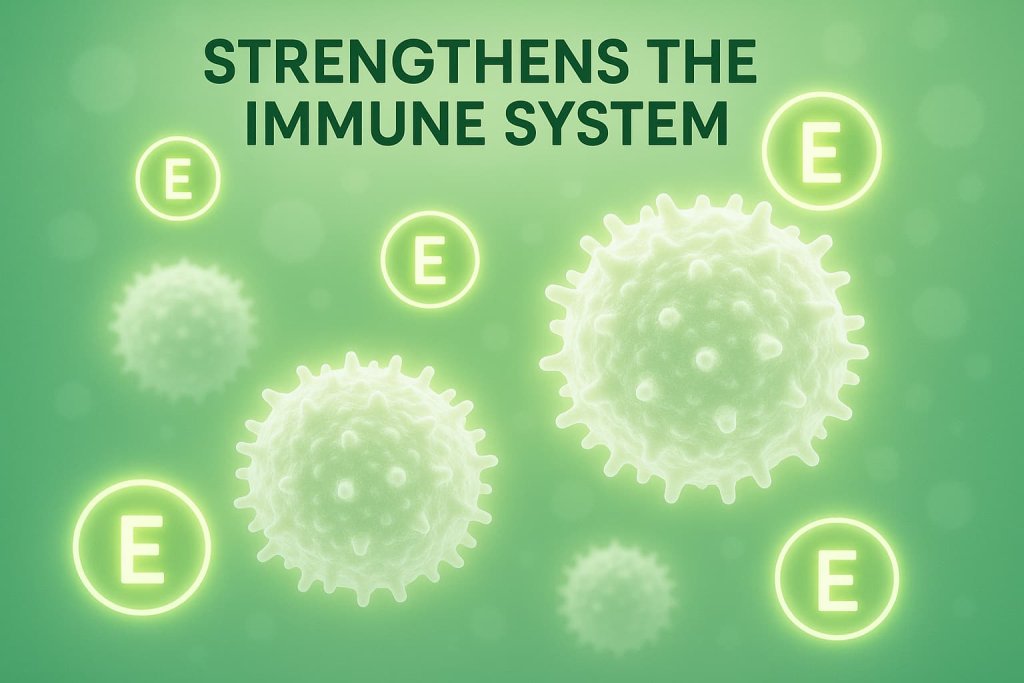
A healthy immune system relies on adequate antioxidant protection — and vitamin E plays a crucial role here.
Studies published in Advances in Nutrition (2020) show that vitamin E enhances the activity of T-cells, the white blood cells responsible for attacking pathogens. This effect is especially noticeable in older adults, whose immune defenses naturally weaken with age.
By lowering oxidative stress in immune cells, vitamin E improves antibody response, infection resistance, and inflammation control.
For best results, combine vitamin E with other immune-supportive nutrients such as vitamin C, zinc, and selenium.
Tip: A handful of nuts or seeds daily can give your immune system a measurable antioxidant boost.
3. Promotes Healthy, Radiant Skin
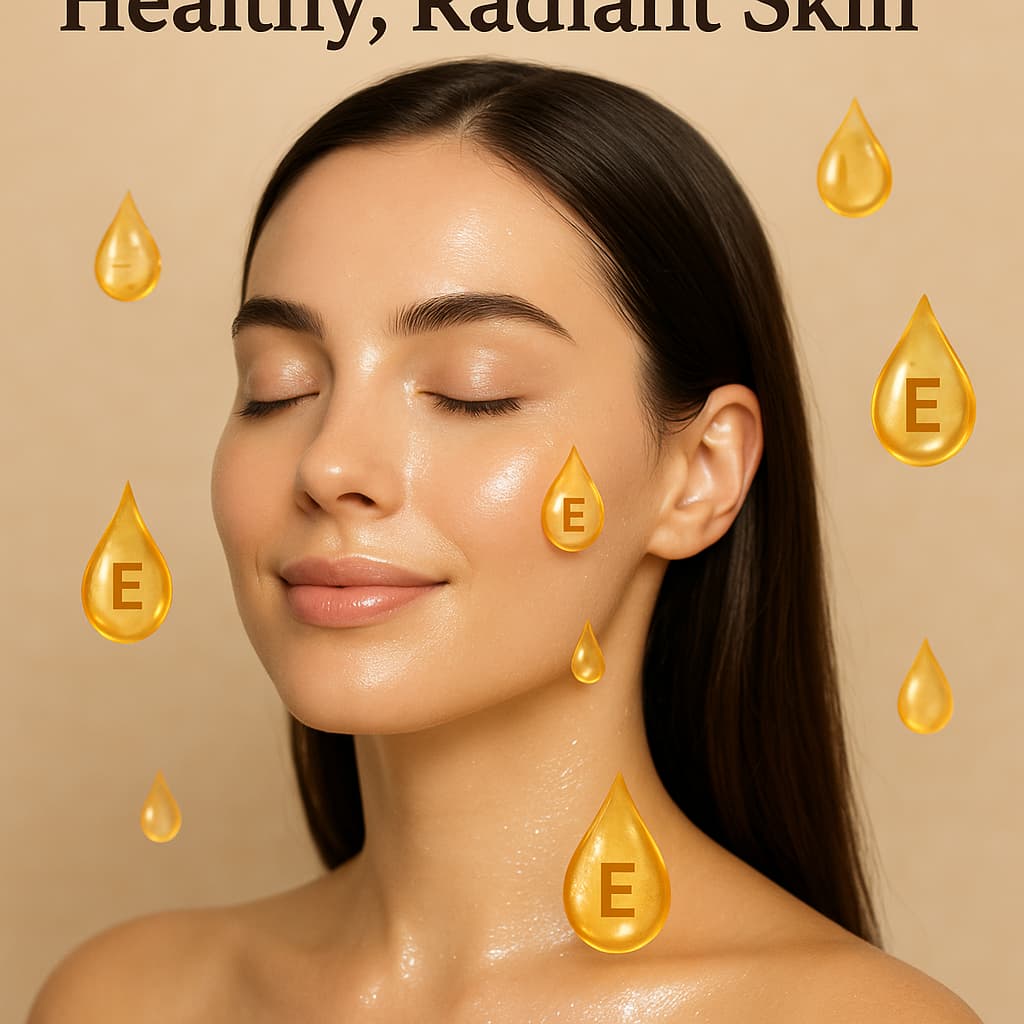
Vitamin E is often called the “skin vitamin” for good reason. It helps maintain the lipid barrier of the skin, locking in moisture and preventing dryness. It also aids wound healing by promoting new cell growth and reducing inflammation.
When used topically or consumed through diet, vitamin E protects the skin from UV-induced oxidative stress — one of the main causes of premature wrinkles and dark spots.
According to the Cleveland Clinic, vitamin E creams and oils can assist in scar healing, soothe sunburn, and reduce fine lines over time.
Pro tip: For maximum skin defense, dermatologists recommend pairing vitamin E with vitamin C — they work synergistically to neutralize free radicals and repair sun damage.
4. Supports Heart and Circulatory Health
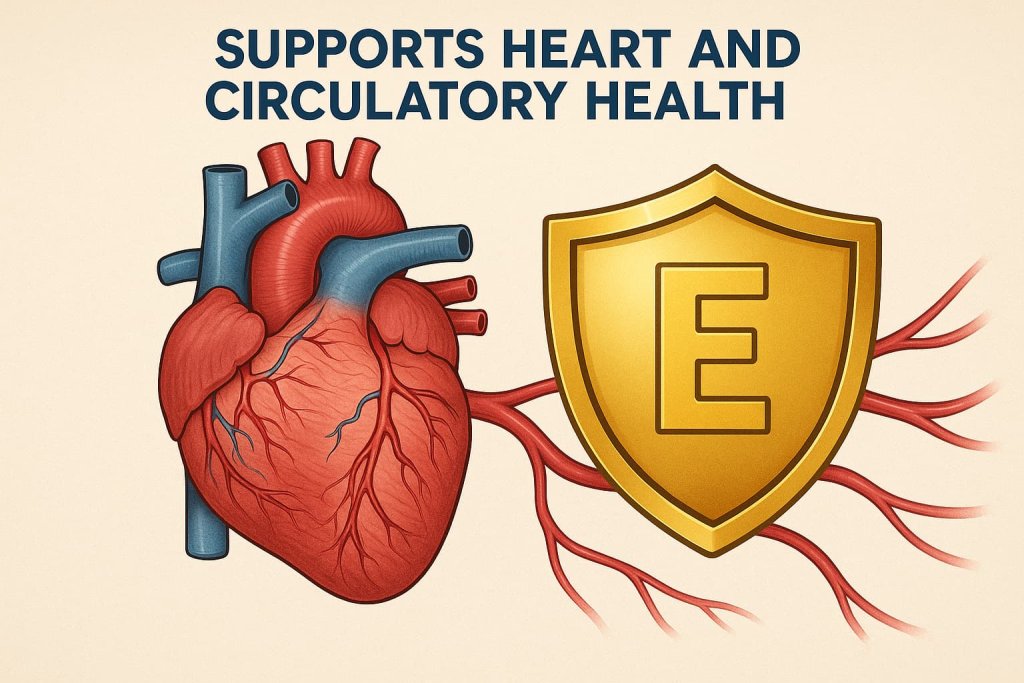
Vitamin E helps protect your cardiovascular system by preventing the oxidation of LDL cholesterol, a key step in plaque formation inside arteries. Oxidized LDL triggers inflammation and arterial stiffness — early markers of atherosclerosis.
According to the NIH Office of Dietary Supplements (2024), getting enough dietary vitamin E may support normal blood vessel dilation and reduce clot formation.
While supplements haven’t consistently proven to prevent heart disease, research suggests that vitamin E from whole foods contributes to better heart function and reduced oxidative damage to lipids.
In essence: Vitamin E helps keep your arteries flexible and your blood flowing smoothly.
5. Protects Eye Health
Your eyes are highly sensitive to oxidative stress due to constant light exposure and oxygen use. Vitamin E protects the retina’s delicate photoreceptor cells from oxidation and may slow age-related eye decline.
Findings from the Age-Related Eye Disease Study (AREDS) indicate that a combination of vitamin E, vitamin C, zinc, and beta-carotene helps reduce progression of macular degeneration and supports overall visual performance.
Other observational studies link higher dietary vitamin E intake with a lower risk of cataracts in older adults.
Bottom line: Consuming vitamin E-rich foods can help keep your eyes clearer and healthier as you age.
6. Supports Brain and Cognitive Function
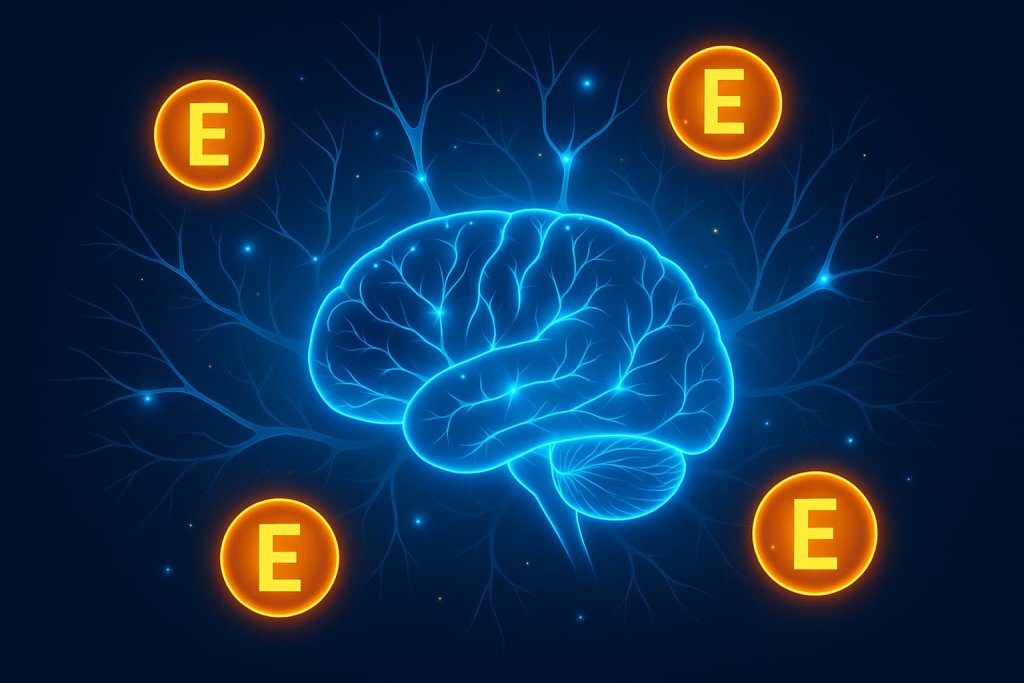
The brain is extremely vulnerable to oxidative damage because of its high oxygen demand and fat content. Vitamin E helps protect neurons from lipid peroxidation — one of the earliest processes in cognitive decline.
Research published in JAMA found that vitamin E supplementation delayed functional decline in patients with mild-to-moderate Alzheimer’s disease. Although not a cure, it may help preserve daily functioning by slowing the breakdown of nerve membranes.
Dietary vitamin E intake has also been linked to better memory performance and slower cognitive aging in healthy adults.
Combining vitamin E with omega-3 fatty acids further supports brain resilience.
7. May Improve Liver Health
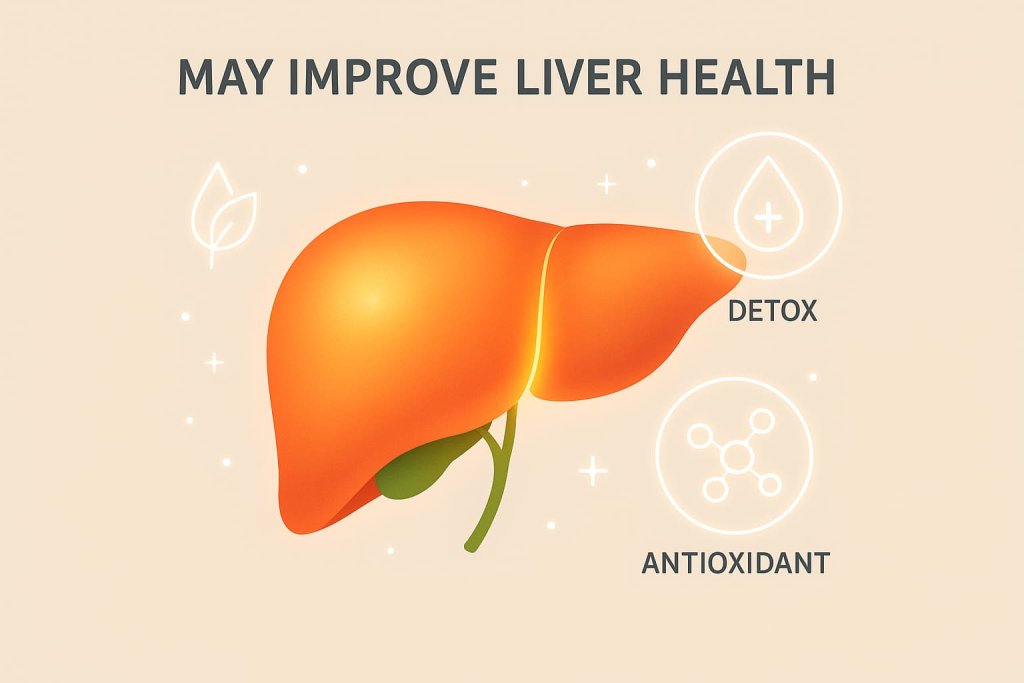
Vitamin E shows strong promise in supporting liver function, especially in individuals with non-alcoholic fatty liver disease (NAFLD). The nutrient reduces oxidative stress and inflammatory damage in liver tissues, helping prevent further fat accumulation.
A 2023 meta-analysis in Frontiers in Public Health found that vitamin E therapy significantly improved ALT and AST liver enzyme levels, suggesting better liver cell integrity.
Doctors sometimes recommend vitamin E supplementation (under supervision) for non-diabetic adults with biopsy-proven NASH (a severe form of fatty liver).
Note: Always consult a hepatologist before supplementing, as dosage and duration vary per condition.
8. Reduces Inflammation and Improves Skin Healing
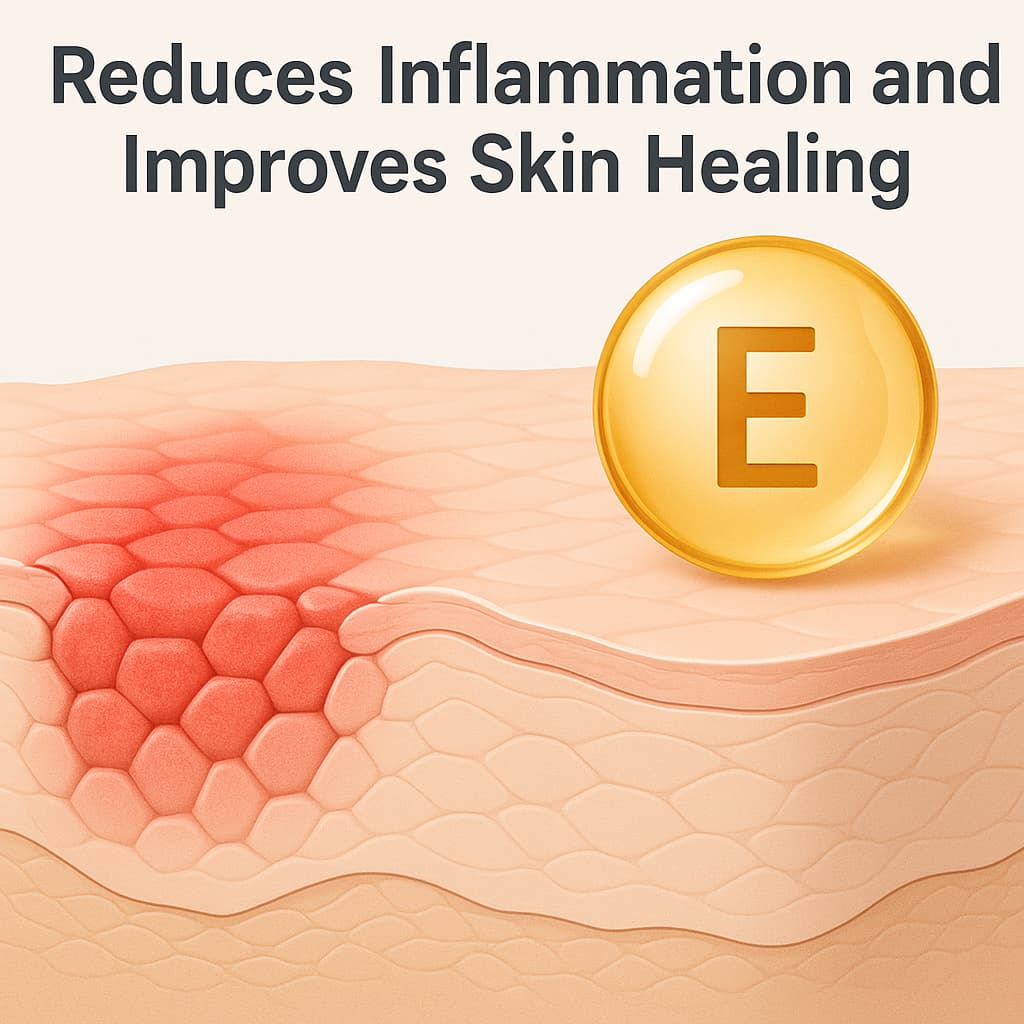
Chronic inflammation accelerates tissue damage and aging. Vitamin E acts as a natural anti-inflammatory nutrient, reducing cytokine levels such as C-reactive protein (CRP) and IL-6.
This property makes vitamin E beneficial in managing eczema, psoriasis, and sunburn recovery. It aids collagen synthesis, speeds up wound closure, and minimizes post-inflammatory hyperpigmentation.
Some topical preparations combine vitamin E with aloe vera or green-tea extract for added soothing effects.
In short: Vitamin E not only reduces internal inflammation but also restores and rejuvenates the skin barrier from the outside.
9. May Lower Risk of Blood Clots
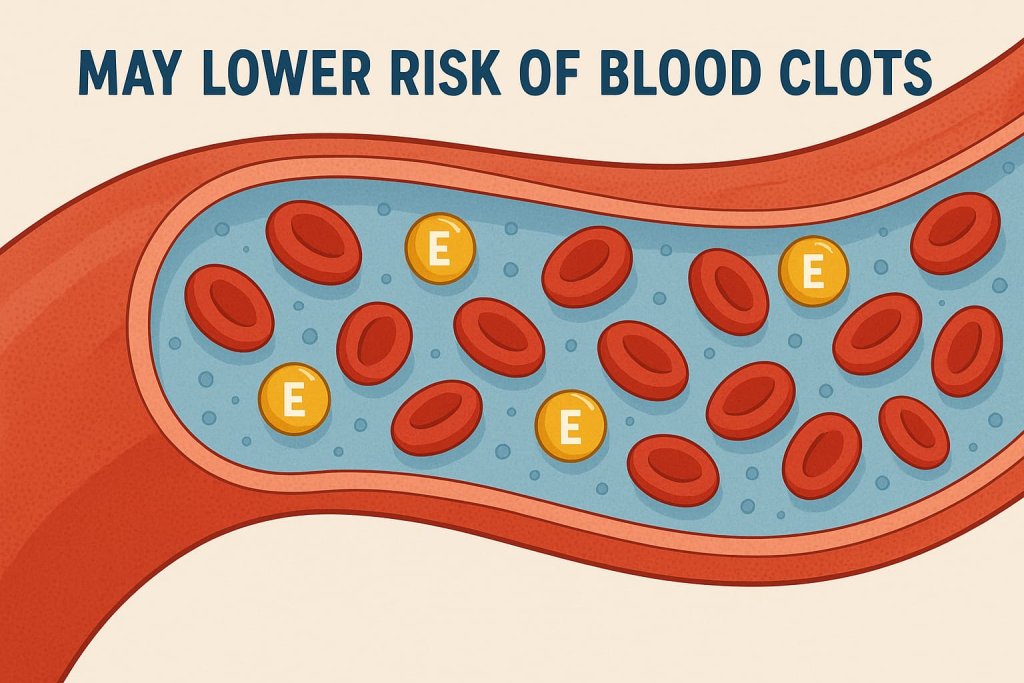
Vitamin E helps maintain blood flow by acting as a mild anticoagulant. It inhibits platelet aggregation — the clumping together of blood cells that can form dangerous clots.
The Women’s Health Study reported that long-term vitamin E supplementation reduced the risk of venous thromboembolism (VTE) by about 21 %.
This effect is more pronounced in individuals with a genetic predisposition to clotting disorders.
However, because high doses can increase bleeding risk when combined with blood thinners, moderation and medical supervision are essential.
10. Supports Hormone and Reproductive Health
Vitamin E is vital for reproductive wellness and hormonal balance in both men and women.
It helps regulate sex hormones by protecting the endocrine glands from oxidative stress. In men, it supports sperm motility and DNA integrity, while in women it may aid menstrual cycle regularity and reduce premenstrual discomfort.
Animal and human studies show that vitamin E deficiency can lead to fertility issues due to oxidative damage in reproductive tissues. That’s why it’s often called the “fertility vitamin.”
Quick tip: Combine vitamin E-rich foods like avocados, seeds, and olive oil with healthy fats to enhance absorption.
How Much Vitamin E Do You Need Daily?
| Group | Recommended Dietary Allowance (RDA) | Source: NIH ODS |
|---|---|---|
| Adults (men & women) | 15 mg (22.4 IU) | |
| Breastfeeding women | 19 mg (28 IU) | |
| Children 1–13 years | 6–11 mg | |
| Infants 0–6 months | 4 mg |
Foods Rich in Vitamin E
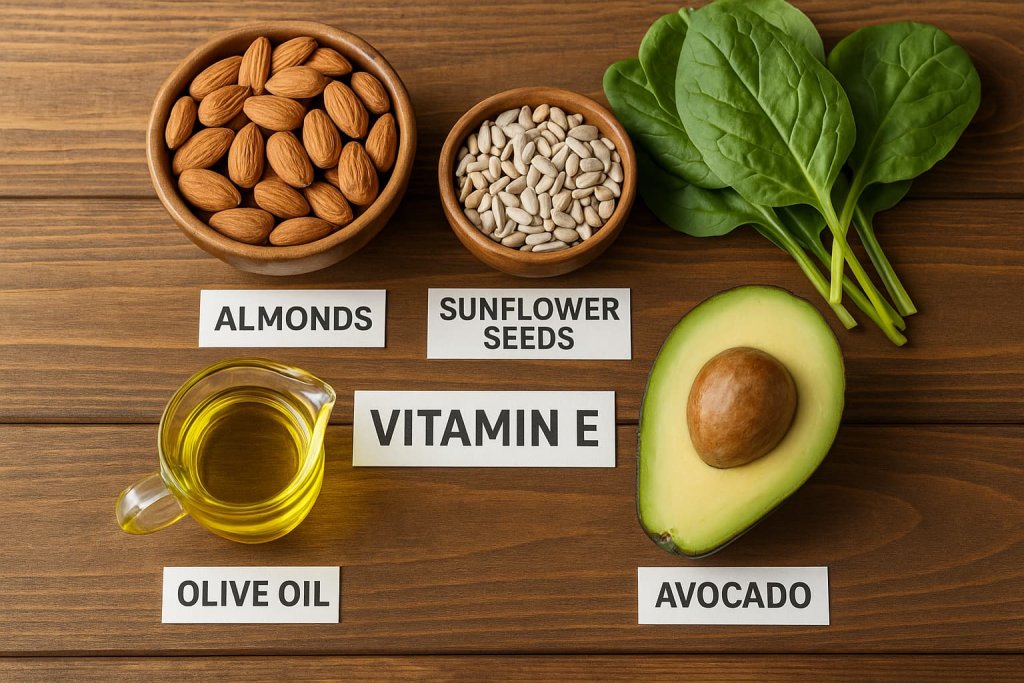
| Food | Vitamin E (per serving) | Notes |
|---|---|---|
| Sunflower seeds (1 oz) | 7.4 mg | Excellent plant source |
| Almonds (1 oz) | 7.3 mg | Easy daily snack |
| Spinach (½ cup cooked) | 1.9 mg | Also rich in vitamin K |
| Avocado (½ fruit) | 2.1 mg | Adds healthy fats |
| Olive oil (1 tbsp) | 1.9 mg | Versatile for cooking |
| Peanuts (1 oz) | 2.4 mg | Budget-friendly |
| Broccoli (½ cup cooked) | 1.1 mg | Great side dish |
Possible Side Effects and Precautions
- Excess intake (> 1,000 mg per day) may cause nausea, fatigue, or bleeding.
- Blood thinners: Vitamin E may amplify effects of warfarin, aspirin, or other anticoagulants.
- Prostate cancer risk: The SELECT trial found high-dose synthetic vitamin E supplements increased prostate cancer risk in some men.
- Pregnancy: Stick to dietary or prenatal vitamin doses unless advised by your doctor.
👉 Always consult a healthcare provider before taking supplements.
FAQs About Vitamin E
1. Can vitamin E improve skin glow?
Yes. It supports skin barrier repair, reduces dryness, and boosts elasticity, helping skin appear naturally radiant.
2. Is it better to get vitamin E from food or supplements?
Food sources are best. Supplements should only be used if you have a deficiency or specific medical advice.
3. Can vitamin E help with acne scars?
Topical vitamin E may help fade mild scars but can irritate sensitive skin — patch test first.
4. Does vitamin E help in weight loss?
No direct link exists, but by reducing inflammation and improving metabolic health, it supports an overall healthy system.
5. Is vitamin E safe to take daily?
Yes, within the RDA (15 mg daily). Avoid exceeding the upper limit without medical supervision.
6. What’s the difference between natural and synthetic vitamin E?
Natural vitamin E (d-alpha-tocopherol) is better absorbed than synthetic (dl-alpha-tocopherol).
7. Can I take vitamin C and E together?
Yes — they work synergistically. Vitamin C helps regenerate oxidized vitamin E, enhancing antioxidant power.
Conclusion
Vitamin E is a potent antioxidant that supports skin health, immune defense, heart protection, and brain function.
While supplements can help in specific cases, the best way to maintain optimal levels is through a balanced diet rich in nuts, seeds, leafy greens, and healthy oils.
Start adding vitamin E-rich foods to your meals today and let your body benefit from its science-backed healing power.
References
NIH Office of Dietary Supplements — Vitamin E Fact Sheet
https://ods.od.nih.gov/factsheets/VitaminE-Consumer/
(Covers functions, RDA, sources, and safety; reviewed April 2024)
Harvard T.H. Chan School of Public Health — Vitamin E: The Nutrition Source
https://nutritionsource.hsph.harvard.edu/vitamin-e/
(Explains antioxidant role, immune support, and disease prevention)
National Eye Institute — AREDS & AREDS2 Clinical Trials Overview
https://www.nei.nih.gov/research/clinical-trials/age-related-eye-disease-studies-aredsareds2
(Evidence that vitamin E with other nutrients helps slow macular degeneration)
JAMA (2014) — Dysken MW et al. “Effect of Vitamin E and Memantine on Functional Decline in Alzheimer Disease.”
https://jamanetwork.com/journals/jama/fullarticle/1812559
(High-dose vitamin E slowed functional decline in mild-to-moderate Alzheimer’s patients)
Circulation (2007) — Glynn RJ et al. “Effects of Vitamin E on Risk of Venous Thromboembolism: Women’s Health Study.”
https://www.ahajournals.org/doi/full/10.1161/CIRCULATIONAHA.107.713867
(Found long-term vitamin E use reduced risk of blood-clot formation in women)
